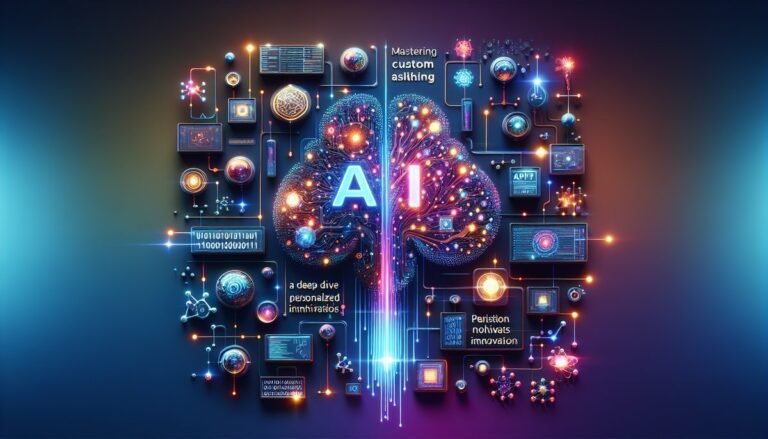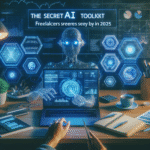In an era where technology shapes every aspect of our lives, the concept of “AI Uncritical Thinkers” emerges as both a humorous yet concerning reflection of our times. The idea put forth by Brianna Parkins that those who fail to think independently might soon find themselves pestering Artificial Intelligence rather than humans, offers a unique lens through which to examine our evolving relationship with technology. The notion suggests a future where AI becomes the unwilling confidant or mentor, navigating the queries of those who prefer to outsource their cognitive efforts.
AI as the New Sage: A Double-Edged Sword
Imagine a world where AI systems are not just tools, but the go-to advisors for uncritical thinkers. This scenario presents a paradox of sorts. On one hand, AI is equipped to process vast amounts of data quickly, offering insights that humans might overlook. On the other, the very act of relying too heavily on AI could lead to a diminished capacity for independent thought among individuals. If AI becomes the primary source of answers, will it inadvertently encourage intellectual laziness, or will it inspire a new era of informed decision-making?
The Comfort of a Digital Confidant
For those who find solace in technology, AI’s rise as a digital confidant might seem comforting. Picture a world where individuals, unsure of themselves, turn to AI for guidance on everything from mundane daily decisions to profound life choices. The allure is undeniable; who wouldn’t want a tireless, judgment-free assistant ready to offer advice at any hour? However, this reliance could foster a dependency that might stifle personal growth and critical analysis, essential components of human development.
Redefining Human Interaction: A Shift in Social Dynamics
The prospect of AI stepping in as a conversational partner for uncritical thinkers also hints at a broader shift in social dynamics. As people begin to engage more with AI, the nuances of human interaction stand to change. Conversations that once required negotiation, empathy, and emotional intelligence might now be replaced by straightforward exchanges with AI. This transformation begs the question: What becomes of our social skills when convenience trumps complexity?
Opportunities and Challenges of AI Integration
Of course, integrating AI into our daily lives is not without its advantages. For instance, AI could potentially serve as a catalyst for innovation, driving individuals to explore new ideas and solutions. However, this optimistic outlook is tempered by the potential pitfalls of over-reliance. The challenge lies in balancing AI’s capabilities with the need to nurture human intellect and creativity. Ensuring that AI functions as a complement rather than a crutch could be key to fostering a harmonious coexistence.
In conclusion, the thought-provoking idea proposed by Brianna Parkins about “AI Uncritical Thinkers” invites us to reflect on the future of our interaction with technology. As we navigate this digital landscape, the challenge will be to harness the power of AI while preserving the essence of human thought and interaction. The journey promises to be as complex as it is fascinating, with AI poised to play a pivotal role in shaping the thinkers of tomorrow.
Challenging the Role of AI in Human Decision-Making
In a world increasingly dominated by Artificial Intelligence, the question arises: how might AI influence those who struggle with independent thinking? As Brianna Parkins suggests, perhaps the burden of decision-making could shift from humans to machines, alleviating some societal pressures. This shift presents both opportunities and challenges, as AI’s influence may be seen as a double-edged sword.
On one hand, AI’s ability to process vast amounts of data and identify patterns can aid those reluctant to make decisions by providing well-reasoned options. For instance, AI-based recommendation systems on platforms like Spotify or Netflix already help users discover new content by predicting preferences. Such systems can be extended to more critical areas like health management or investment decisions, offering a safety net for those who might otherwise rely on guesswork.
The Paradox of Over-Reliance on AI for Uncritical Thinkers
However, the real challenge lies in the potential for over-reliance. When individuals consistently defer to AI, there is a risk of diminishing critical thinking skills. This paradox highlights the necessity for balance. An over-dependence on AI for decision-making could result in a population less equipped to scrutinize or challenge AI’s conclusions, which could be perilous if the AI is flawed or biased.
Consider a hypothetical scenario: a financial advisor powered by AI suggests investment strategies. An uncritical thinker might follow these blindly, without understanding or questioning the underlying assumptions. If the AI’s algorithm inadvertently favors certain stocks due to biased data, the investor might incur significant losses without ever realizing the oversight. Thus, fostering a culture of inquiry and skepticism remains crucial, even in the age of advanced AI.
AI as a Catalyst for Intellectual Growth
Interestingly, AI could also serve as a catalyst for intellectual growth among those less inclined to think critically. By prompting users to engage with data and outcomes, AI can encourage a deeper understanding of various topics. For instance, AI-driven educational platforms can personalize learning experiences, challenging students to explore subjects beyond their immediate interests.
Consider an AI tutor that adapts to a student’s learning curve, offering progressively complex problems as the student’s understanding deepens. This not only aids in knowledge acquisition but also sharpens analytical skills. By interacting with AI, learners can develop a more nuanced perspective, transforming from passive recipients of information to active participants in their educational journey.
Mitigating Bias: A Collaborative Effort
To ensure that AI benefits rather than hinders intellectual development, addressing inherent biases in AI systems is paramount. Biases, often stemming from skewed training data, can perpetuate misinformation or reinforce stereotypes. Collaborative efforts between data scientists, ethicists, and policymakers are essential to create more equitable AI systems.
Imagine a future where AI models are routinely audited by diverse teams to identify and correct biases. Such initiatives can pave the way for AI systems that not only provide accurate information but also promote inclusivity and fairness. The involvement of varied perspectives can help ensure that AI serves as a tool for empowerment rather than a crutch for uncritical thinkers.
Encouraging a Symbiotic Relationship with AI
Ultimately, fostering a symbiotic relationship between humans and AI is vital. While AI can indeed take on some cognitive burdens, it should not replace the human capacity for critical thinking, creativity, and ethical reasoning. Instead, AI should complement human decision-making, offering insights and information that empower individuals to make informed choices.
To achieve this, educational systems and workplaces must prioritize the development of critical thinking skills, ensuring that individuals can effectively evaluate AI-driven recommendations. By doing so, society can leverage AI’s potential while safeguarding the intellectual autonomy of its members. In this way, people who are prone to uncritical thinking might just find a new ally in AI, one that challenges them to think deeper and act wiser.
In conclusion, while AI offers significant potential benefits for those who struggle with independent thinking, the key lies in balancing reliance on technology with the cultivation of innate human capabilities. As Brianna Parkins suggests, perhaps AI will shoulder some of the mental load, yet it is crucial that we continue to foster a culture of critical engagement and intellectual curiosity.
AI: The New Sounding Board for Human Thought
As we contemplate the intriguing possibility that those reluctant to engage in independent thinking may soon direct their queries towards Artificial Intelligence, rather than their fellow humans, a new dimension of AI’s role in society emerges. This shift could redefine the interaction between humans and machines, liberating individuals from the burden of trivial questions while simultaneously challenging AI to evolve in its problem-solving capabilities. The potential for AI to absorb these inquiries opens a gateway to a future where human creativity and critical thinking are reserved for more profound pursuits.
Looking beyond traditional tech applications, this paradigm invites us to explore unconventional avenues where AI can flourish. From creative industries to personalized education, the horizon is vast and untapped. As AI becomes the preferred oracle for the incurious, its capacity for understanding context and nuance will need to expand, fostering advancements that could, in turn, enhance its utility across diverse sectors. Ultimately, the prospect of AI shouldering the questions of the less inquisitive could free up human potential, encouraging a societal shift towards innovation and deeper intellectual exploration.
What impact will AI have on human intellectual engagement?
AI might take over routine inquiries, allowing humans to focus on complex problem-solving and creative endeavors. This shift could foster a renaissance in human intellectual engagement and innovation.
How can AI evolve to handle more intricate queries effectively?
For AI to manage more sophisticated questions, advancements in machine learning and natural language processing are crucial. These developments will enhance AI’s ability to understand context and provide nuanced responses.
What are the risks of relying heavily on AI for everyday questions?
Overreliance on AI could lead to diminished critical thinking skills among individuals. It is essential to balance AI use with personal intellectual development to maintain sharp cognitive abilities.
How can unconventional tech applications benefit from AI’s new role?
By redirecting simple queries to AI, fields like personalized education and creative industries can leverage AI to provide tailored experiences, thereby enhancing productivity and innovation.
Discover More on AI’s Expanding Role
- Make Apple Carplay Wireless
- Ai Big Data Humanitarian Logistics
- Machine Learning Disease Detection
- Sam Altman Io Trademark
- Sandbox First Enterprise Ai Innovation
- Wireless Apple Carplay Guide
- Best Navigation Apps For Car Tablets
- Iit Delhi Data Science Certification
- Best Wireless Carplay Adapter
- Gemini Ai Agent






